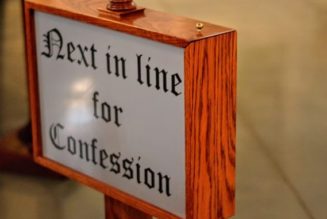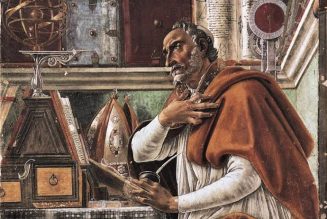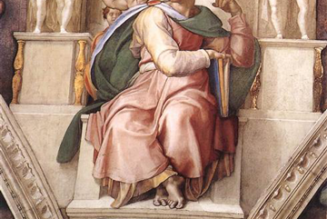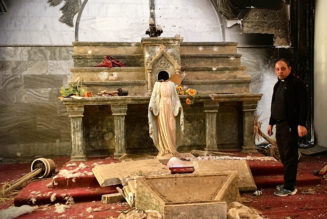
Before I finish this article, it will be obvious how my family and I will vote on November 3, and why. But I’ll also speak of a man whose Catholic faith and public service I greatly admire. And he’ll very likely vote in the opposite direction, for a different set of reasons. There’s a lesson in that.
The Church doesn’t tell us which candidates to vote for. Except in the most extreme circumstances, she can’t; that’s not her mission. But she can and does seek to guide us in thinking about issues and priorities. And that is part of her mission. How we vote is finally a matter of personal conscience. No one has a right to force another person to act contrary to his or her conscience. But we also need to remember that freedom of conscience, like every other freedom, carries a mortgage. We’re always responsible to do what’s morally right, as we understand it—and sooner or later, God will hold us accountable for our choices and actions. So voting is always a serious matter.
I want to start with a short list of statements that will seem irrelevant. But bear with me, and I think you’ll see where I’m going:
I believe in progress.
I believe in science.
I believe that love is love and kindness is everything.
I believe that an angel dictated the Koran to Muhammad.
I believe that sexual identity is a matter of self-discovery and choice, not biology.
I believe that life has no meaning except the meaning we create for ourselves.
I believe there is no God.
I believe that Jesus Christ is the Son of God.
All of these statements share a common thread: They’re creedal. They’re assertions of personal belief. And that leads me to make two observations.
Here’s my first point: We all believe in something. There are no non-believers. We’re not all formally “religious” in the Western sense of the word. But no matter how well we disguise or deny it, we all—in effect—worship something. We all organize our lives around certain basic convictions that can’t be proven but to which we nonetheless commit ourselves. For example, we all agree that “black lives matter.” This is so because, as Christians, we believe that all lives matter, and many people of color have suffered great injustice and been denied their God-given dignity. But why any life matters depends on our beliefs about the nature and purpose of the human person.
Some beliefs are clearly more reasonable than others. But reason itself is limited by the human sense organs that our reasoning depends on, and they provide us with measurable, material facts, not purpose or meaning. This is why the Church has always placed such a heavy emphasis on the mutual dependence of faith and reason. Human beings need both. Faith without reason becomes sentimental nonsense. And reason without faith is dangerous; it lacks direction and meaning, and therefore always ends up as a weapon of the powerful.
Now having said all that:
Here’s my second point: Being Catholic begins at baptism. But if we want to live with honesty and integrity, it can’t end there. Being Catholic means submitting ourselves, and the way we think and live, to certain organizing beliefs. Jesus Christ is the only Son of God. He founded the Church. The Church teaches with his authority, even when her leaders and people are sinners. Lots of people claim to be Catholic. But unless we trust the Word of God and the teaching of the Church, and practice our faith with prayer and actions, we’re just deluding ourselves—and God, if he’s really God, won’t be fooled.
When I say to my wife, “I love you,” her response is, “That’s wonderful dear. Now prove it.” Our relationship with God is exactly the same. Our first loyalty, and our real citizenship, is not our political party or even the American nation. Our first loyalty and home is heaven (Phil 3:20). And that fact should rule every aspect of our lives—both personal and public. If we’re not willing to witness with our actions what we claim to believe with our words, then we don’t really believe it. Again, this is a matter of simple honesty.
So what does this mean for Catholic political engagement? It means three things.
First, politics is important. Politics involves the use of power, and the use of power always has a moral dimension. Aristotle taught that politics is one of the most important forms of human activity because it’s the way in which we take part in organizing the welfare of the human community. Second, politics is limited. Augustine reminds us that we’re all sinners and even our best intentions are crippled by sin. We can’t build heaven on earth, and when we try, we create a pretty good replica of hell instead. Utopian politics and social experiments are not just delusions, they’re dangerous. We can’t simply erase the sins of the past and start over from Ground Zero as a society, because we’re all implicated in the same national story. Utopian idealism always ends badly, and the last century is one long lesson in how radically bad it can get. All politics is imperfect. As a result, Augustine would say that we need to be modest and practical in our political goals, while working incrementally to make society as good and as just as we can. Third and finally, Catholic political engagement flows from Catholic social teaching, and it’s precisely our Catholic faith that provides us with something valuable to contribute to society.
So what are the key elements of Catholic social teaching?
First, we have a duty to respect the sanctity of every life and the dignity of every individual. The disabled, the infirm, the elderly, and the unborn child are especially vulnerable in our current political environment because they usually can’t fight for themselves. Second, we have a duty to serve the common good. These two duties can’t be separated. We have obligations to both: We need to respect and protect individuals, and we need to serve the common good Moreover, there’s only one Catholic morality. There aren’t “two” Catholic moralities, one social and one sexual—one for serving the needs of immigrants, racial justice, and the poor, and another for dealing with abortion and sex.
In Catholic teaching, issues of our sexual behavior and issues of social justice are organically linked. They can’t be walled off from one another as unrelated categories. They flow from exactly the same biblical understanding of who and what a human being is. So we can’t be “pro-life” and simply ignore issues of poverty, racism, and access to decent health care. And likewise, we can’t call ourselves “Catholic” and wring our hands piously while we tolerate the industrial-scale killing of 50 million unborn American children over the last four decades. The right to life precedes and undergirds every other right.
So how do we apply all this to our practical political choices, when no choice is ever perfect?
Well, we need to inform ourselves. It’s not hard work, but it does take a little time and commitment to deepen our knowledge of our faith. The U.S. bishops have a useful guide to political reasoning on their website called Forming Consciences for Faithful Citizenship. It’s very much worth reading. But the better, clearer guide—available as a free download on their website—is the bishops’ 1998 pastoral statement Living the Gospel of Life. It’s excellent, practical, and concise.
I’d also strongly suggest reading Render Unto Caesar, the 2008 book by Philadelphia’s former archbishop, Charles Chaput. It’s a good guide to thinking about our nation and its politics from a Catholic perspective. It’s fair and comprehensive, and an easy read.
What we need to understand is that many social issues are important—genuinely important—but not all important issues have the same weight. Stealing from my company’s petty cash is bad. Cheating on my spouse is worse. Murdering my neighbor is worst. They’re all bad actions. They all cause real harm. But they don’t have the same gravity. And it’s misleading to tie them all together as somehow equal. Because they’re not.
My wife and I have a son with Down syndrome, and three of our 10 grandchildren have moderate to severe disabilities. The intentional killing of an innocent human being can never be excused. And arguments about whether an unborn child is “fully human” are deceitful and irrelevant.
So for us, abortion is the foundational political issue of our age. We simply will not vote, ever, for a candidate who supports easy access to, or loose restrictions on, abortion. Nor will we vote, ever, for a candidate who supports policies that attack the Church and her ministries, undermine the integrity of the Christian family, interfere with the religious freedom of believers, or legitimize destructive sexual behavior. To take another example: For my wife and me, when a candidate supports the idea of transgender surgery for children, he or she is not being “tolerant,” but criminally negligent. That seems like it should be obvious to anyone with common sense and a decent moral formation. So it shouldn’t be hard to figure out how we’ll vote next Tuesday, and it won’t be for the Democratic ticket. But of course, others will do the calculus of this election differently. And some of those others I do admire greatly.
Dan Lipinski is a Democratic congressmen from southwest Chicago. His father was a congressman for 21 years. Dan won his seat in Congress when his dad retired. Dan has a doctorate in political science from Duke, he’s finishing his 16th year in Congress, and he’s a man of outstanding intellect and sincere Christian faith. In every sense, Dan is a real-deal Catholic. Throughout his political career he’s been genuinely pro-life, genuinely pro-family, and a committed supporter of the rights of the Church and religious freedom. And as a result, his own party abandoned him this year and ran an opponent against him in the Democratic primary.
Dan lost that primary, and in losing—come this January—he’ll lose not just the vocation of public service that he loved, but also his family’s livelihood. But Dan will stay in the Democratic Party and work to reform it from within. For Dan, the Democratic Party, on the balance, remains the better choice for our country. Thus he’ll probably vote for his party’s ticket. I don’t understand how Dan Lipinski can reason his way to that decision this November with the issues that we face. I think he’s wrong. But I’m not God. I do know that he’s a man of integrity, that he paid a serious price for that integrity, and that good people like him will nonetheless vote quite differently from my family and me this year, and they’ll do it with a clean heart.
So here’s a final thought.
What the Church expects us to do in this and every election is to follow our consciences—but also to form our consciences intelligently, in accord with Christian truth. A healthy conscience is a blessing, but it’s never a convenience. It’s not a free-floating personal opinion machine. It needs to be fed and developed and disciplined in a way so that it can recognize what’s right, and then insist on what’s right, even when we don’t want to hear it. What the Church asks is that, before we vote, we at least make a sincere effort to understand the truths which she teaches and why she teaches them, and then try honestly to follow her wisdom. If we do that, we’ve done what our faith requires by putting our faith first. That might sound easy, but it’s very hard in our current culture, where serious thought about anything is drowned out in emotion, distraction, heat, and noise.
As Catholics it’s our job to remove ourselves from those things, and to think before we vote so that we act with our brain and an examined conscience, and not just with our bile and emotions and the latest distortions from our mass media. And finally we also need to pray for our country and for each other—because we all very obviously need it.
(Editor’s note: The views expressed by the author are his own; CWR does not endorse political candidates or parties.)
If you value the news and views Catholic World Report provides, please consider donating to support our efforts. Your contribution will help us continue to make CWR available to all readers worldwide for free, without a subscription. Thank you for your generosity!
Click here for more information on donating to CWR. Click here to sign up for our newsletter.
Join Our Telegram Group : Salvation & Prosperity








